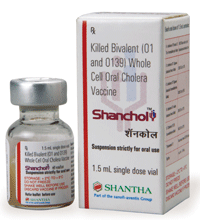
Shanchol - Cholera vaccine by Shantha Biotechnics
Efforts to accelerate global use of new generation cholera vaccines gained significant momentum with the licensure of a new oral cholera vaccine, Shanchol, from Shantha Biotechnics in India in 2009.
The product won the BioSpectrum Asia Pacific Bioscience Industry Product of the Year Award for 2010.
Approximately 200,000 cases of cholera cases per year are notified to the World Health Organization (WHO) in 2007 from 52 countries. This represents an increase of 46 percent in the mean number of cases reported during 2002-05 period. In India alone, the overall incidence of cholera is estimated as 1.9 cases per 1,000 but can be as high as nine per 1,000 among children. There are many outbreaks but cholera as a disease is largely unreported.
India used to administer an injectable vaccine in the 1970s when cholera was a notifiable disease. However, in 1973, its use was scrapped, as it was only 30 percent effective and provided immunity only for eight months. The only WHO-pre-qualified oral cholera vaccine to date is the double dose Swedish vaccine called Dukoral, which is priced at $60 and needs to be co-administered with a relatively high volume of buffer solution.
After 38 years, Indian population gets an affordable and efficacious cholera vaccine in the form of Shanchol. The bivalent oral vaccine is produced by the Indian vaccine giant, Shantha Biotechnics, which is now part of the Sanofi-Aventis group after its vaccines division Sanofi Pasteur, the world's largest vaccine-maker, bought Shantha from Merieux for $550 million, valuing the company at a stunning Rs 3,740 crore (about $809 million), more than 16 times its turnover.
Shanchol consists of killed whole cells from a mix of pathogenic strains of Vibrio cholerae (O1and O139) and is given in two doses, each dose in six weeks gap. The vaccine currently priced at $1.85 is licensed for use in adults and children above one year old. The product is very innovative as it incorporates all the important genes required to make it very selective and more effective without harming the intestines in any way. It is designed to prevent even severe infections caused by various mutants of the cholera virus.
The vaccine was approved in India last year based on the results of phase II trial on 70,000 human subjects (aged one year and over) conducted in Kolkata by the National Institute of Cholera and Enteric Diseases (NICED). The Kolkata trials found the oral cholera vaccine to provide over 67 percent protection and no decline in protection over two years. Shantha Biotech has spent $1.5 million to set up facilities for Shanchol production.
The bivalent inactivated-whole-cell oral cholera vaccine has been developed in collaboration with the International Vaccine Institute (IVI), Seoul, South Korea. IVI scientists developed this vaccine, with funding from the Bill & Melinda Gates Foundation, by significantly modifying a vaccine used and produced only in Vietnam by VA Biotech, so that it meets international GMP standards and WHO production guidelines.
Following field trials in India and Vietnam showing the new vaccine to be safe and immunogenic in both adults and children, IVI scientists transferred the technology for the vaccine to Shantha Biotechics. "Shanchol is the first new vaccine to be developed and licensed with funding from the Gates Foundation, also the first licensed vaccine developed by the IVI" says Mr Varaprasad Reddy, Managing Director, Shantha Biotechnics, Hyderabad, India.
The IVI aims to make this vaccine available for use in public health programs in India and other cholera-affected countries in Asia and Africa to control endemic cholera, also to help control large scale outbreaks.
Shantha has applied to WHO for pre-qualification of Shanchol, to allow its purchase by United Nations agencies, including UNICEF, and to facilitate its use in other countries. The company is currently producing 1.5 million doses of the vaccine but Mr Reddy has plans to scale it up to 10 million doses in the next few years.
Among other developments, the company is progressing with its plans to start the first human clinical trial of rotavirus vaccine. It is also about to start the phase I trial for the typhoid polysaccharide in the next few months. The company is also in the process of developing a hexavalent vaccine.
As the first Indian company to launch an r-DNA hepatitis B vaccine, Shanvac B, in 1997, Shantha heralded a new beginning for biotechnology and affordable healthcare in India. The Indian company continues to push boundaries and transcend limitations, bolstered by its research-driven scientific ethos. Shantha spends 24 percent of its revenue for R&D each year.




